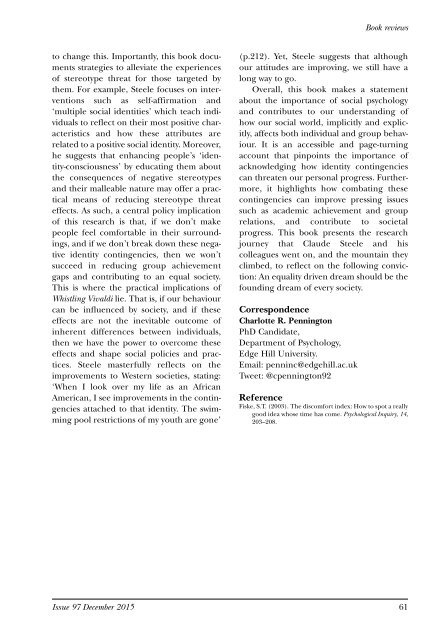Social Psychology Special Issue
XFCu7
XFCu7
You also want an ePaper? Increase the reach of your titles
YUMPU automatically turns print PDFs into web optimized ePapers that Google loves.
Book reviews<br />
to change this. Importantly, this book documents<br />
strategies to alleviate the experiences<br />
of stereotype threat for those targeted by<br />
them. For example, Steele focuses on interventions<br />
such as self-affirmation and<br />
‘multiple social identities’ which teach individuals<br />
to reflect on their most positive characteristics<br />
and how these attributes are<br />
related to a positive social identity. Moreover,<br />
he suggests that enhancing people’s ‘identity-consciousness’<br />
by educating them about<br />
the consequences of negative stereotypes<br />
and their malleable nature may offer a practical<br />
means of reducing stereotype threat<br />
effects. As such, a central policy implication<br />
of this research is that, if we don’t make<br />
people feel comfortable in their surroundings,<br />
and if we don’t break down these negative<br />
identity contingencies, then we won’t<br />
succeed in reducing group achievement<br />
gaps and contributing to an equal society.<br />
This is where the practical implications of<br />
Whistling Vivaldi lie. That is, if our behaviour<br />
can be influenced by society, and if these<br />
effects are not the inevitable outcome of<br />
inherent differences between individuals,<br />
then we have the power to overcome these<br />
effects and shape social policies and practices.<br />
Steele masterfully reflects on the<br />
improvements to Western societies, stating:<br />
‘When I look over my life as an African<br />
American, I see improvements in the contingencies<br />
attached to that identity. The swimming<br />
pool restrictions of my youth are gone’<br />
(p.212). Yet, Steele suggests that although<br />
our attitudes are improving, we still have a<br />
long way to go.<br />
Overall, this book makes a statement<br />
about the importance of social psychology<br />
and contributes to our understanding of<br />
how our social world, implicitly and explicitly,<br />
affects both individual and group behaviour.<br />
It is an accessible and page-turning<br />
account that pinpoints the importance of<br />
acknowledging how identity contingencies<br />
can threaten our personal progress. Furthermore,<br />
it highlights how combating these<br />
contingencies can improve pressing issues<br />
such as academic achievement and group<br />
relations, and contribute to societal<br />
progress. This book presents the research<br />
journey that Claude Steele and his<br />
colleagues went on, and the mountain they<br />
climbed, to reflect on the following conviction:<br />
An equality driven dream should be the<br />
founding dream of every society.<br />
Correspondence<br />
Charlotte R. Pennington<br />
PhD Candidate,<br />
Department of <strong>Psychology</strong>,<br />
Edge Hill University.<br />
Email: penninc@edgehill.ac.uk<br />
Tweet: @cpennington92<br />
Reference<br />
Fiske, S.T. (2003). The discomfort index: How to spot a really<br />
good idea whose time has come. Psychological Inquiry, 14,<br />
203–208.<br />
<strong>Issue</strong> 97 December 2015 61



